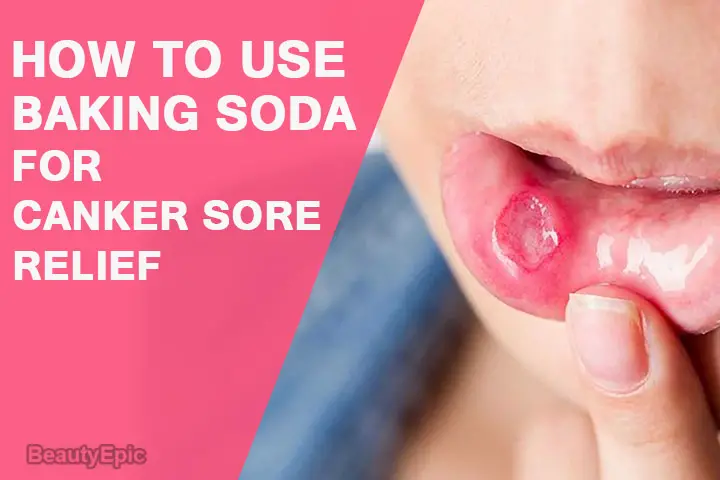
Important: This article is for informational purposes only. Please read our full disclaimer for more details.
Canker sores, also called aphthous ulcers, are small, shallow lesions that grow on the soft tissues of the mouth or at the base of the gums. They are painful, and makes it difficult to eat and talk. Baking soda, known as sodium bicarbonate generally comes in powder form. Here we described some effective homemade ways to use baking soda for canker sore relief.
Does Baking Soda Help Canker Sores?

There are innumerable uses of baking soda. As it has anti-bacterial, anti-fungal antiseptic properties, it does aid in reducing canker sores.
- Canker sores can be sometimes caused by eating a lot of acidic food. Baking soda aids in neutralizing the achis and re balance the pH level.
- It has anti-inflammatory properties. It can help in reducing the swelling and inflammation of canker sores.
- It is anti-bacterial and anti-fungal. It can protect the sores from infection and improve overall health of the mouth.
- It stimulates fresh breath.
- A paste made out of baking soda can also acts as a shield, protecting the sores from further aggravation.
How To Use Baking Soda for Canker Sore?
Baking soda has antibacterial, anti-fungal, antiseptic and anti-inflammatory properties which becomes effective in the treatment of canker sores.
1. Baking Soda Mouth Rinse for Canker Sores
You’ll need
- 1/2 tsp of baking soda
- ½ cup of water
Preparation time: 2 minutes.
How to do
- Add 1/2 tsp of baking soda into ½ cup of water.
- Instead of consuming the mixture, you just have to swish it in your mouth for about a minute and spit it out.
Note: Be careful not to swallow it.
How it works: The swelling and redness will be reduced due to the inflammatory properties present in baking soda.
Repetitions: Once in a day.
[ Read: How to Put Salt on Canker Sore ]
2. Baking Soda and Water for Canker Sore

You’ll need
- 1 teaspoon baking soda
- 1 tablespoon of water
Preparation time: 2 minutes.
How to do:
- Mix baking soda in water to make a smooth paste.
- With the help of your finger or a Q-tip, apply the paste on the ulcer.
- Allow the paste to dry off completely and then using lukewarm water, rinse it off.
Note: Don’t eat or drink anything until the paste dissolves. It might sting a little when first applied and large ulcers will be tender.
Repetitions: You will have to go through this regime once in a day.
3. Baking Soda and Hydrogen Peroxide for Canker Sores
You’ll need
- hydrogen peroxide
- baking soda
Preparation time: 2 minutes.
How to do
- Take small amounts of hydrogen peroxide, baking soda and salt.
- Combine all the three ingredients into a paste.
- Rinse your mouth with this paste 2 to 3 times a day.
Repetitions: 2 to 3 times a day.
4. Aloe Vera and Baking Soda for Canker Sore
You’ll need
- aloe vera juice
- baking soda
How to do
- Using aloe vera juice, thoroughly rinse your mouth.
- Once done, take some baking soda and apply it directly on the sores.
- You can rinse it off with water after a few minutes.
Repetitions: Twice a day.
Tips and Precautions:
Though baking soda is considered therapeutic and safe to cure canker sores, one must follow these guidelines while trying these DIY tricks at home:
- Avoid consuming acidic foods during canker sores.
- You might feel a stinging effect while applying baking soda.
- Do not forget to rinse your mouth with baking soda after every meal.
- People suffering from high blood pressure should be careful lest you should swallow baking soda as it has high levels of sodium.
- Always use a baking soda which is prescribed by dentists.
If the ulcer persists even after trying these home made remedies, do not delay in consulting doctor.
You Might Also Like
- 10 Best Essential Oils for Canker Sores: Benefits and Uses
- 14 Surprising Beauty Benefits of Baking Soda You Must Know!
- Baking Soda Bath: Benefits and How to Do?
- Top 11 Homemade Baking Soda Face Mask Recipes and Benefits
- Homemade Baking Soda Facial Scrub Recipes for Gorgeous Face & Skin
- How to Use Baking Soda for Bad Breath?
- How to Use Baking Soda for Constipation Relief?
- How to Remove Dandruff With Baking Soda?
- Baking Soda for Razor Bumps – Benefits, Uses and Precautions
- How to Use Baking Soda for Stretch Marks?
- How to Whiten Teeth with Baking Soda
- How to Remove Stretch Marks with Baking Soda
- How to Cure an Upset Stomach with Baking Soda?
- How to Get Rid of Sulfur Burps
- How to Get Rid of Roof of Mouth Sore Naturally
Image:- 1















